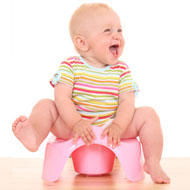What are the Different Tips And Ideas that work during baby Potty Training?
Society demands that a child be adequately potty trained by the age of three years. You could commence the process of potty training by introducing the idea of what it is to “go potty”. Let them associate it with positive verbal reinforcement.
Baby Potty Training Ideas
Patience is the key, and one cannot push the child without reason. In as simple a manner as possible and in different ways, one has to communicate to the toddler the reason for the need for routine. Such training might appear unnatural and irrational to a child who is used to giving in to his or her biological needs. This new call to conform when a biological need arises can be disturbing and upsetting, especially when met with negative consequences. As a result, baby potty training for bowel movements can be quite exhausting. With baby potty training, constipation is a concern, as it interferes with a regular routine that the parents are trying to establish. Encourage the baby to find ways to let you know when he or she actually needs to visit the toilet. Even if the baby doesn’t feel the urge, you should accompany the little one to the potty.
This is particularly important when the baby first wakes up and also before the two of you go to sleep, even before a short nap. Let your child know what you expect and that they are not to blame even if the desired result doesn’t happen. Parents need to understand that accidents are unavoidable and the baby shouldn’t be punished. The child is still too young to understand all that the parents want, and why it is expected of them.
To the baby, negative consequences as a result of accidents in their innerwear are often associated. Consequently, they might associate relieving themselves with something bad and this can lead to constipation. This is because, for a child, negative consequences are things to be avoided and they can’t distinguish any further reasoning. When potty training, parents need all the patience and positive reinforcement they can muster.


